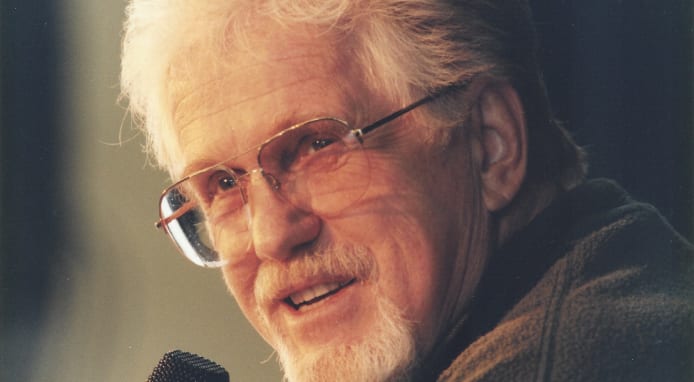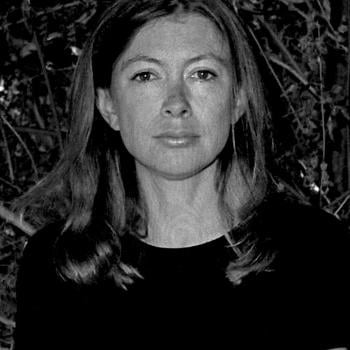I have been neglecting my long-running series on “Unexpected Sites of Christian Pacifism.” But before I got distracted by Trump and travels to Iceland, Germany, Thailand, and Cambodia, I wrote posts about Rand Paul, Charles Spurgeon (my personal favorite, because it riles up so many gun-toting Southern Baptists), and various Pentecostals and holiness adherents of the early twentieth century, all of whom practiced some variety of pacifism.
Today I turn to John Wimber, a founder of the Vineyard movement and a leader of the third wave charismatic movement before he died in 1997. (Click here or watch below, especially at the 5-minute mark, to see some fascinating footage of charismatic practices as he preaches.) Best known for his embrace of signs and wonders, spiritual gifts, and the Holy Spirit—and for his short career in the 1960s as the manager and a talented pianist for the Righteous Brothers—Wimber is not well known for being a biblical pacifist. Heck, his archives are held at Pat Robertson’s Regent University in Virginia. Buried in Wimber’s large oevre, however, is compelling evidence of his commitment to nonviolence.
It appears to have originated in Wimber’s early associations with the Quaker Church. Christianity Today describes the relationship like this: a “beer-guzzling, drug-abusing pop musician, who was converted at the age of 29 while chain-smoking his way through a Quaker-led Bible study.” After his conversion in 1963, he attended Azusa Pacific College. After graduation, he was ordained as a Quaker minister and then joined the pastoral staff of Yorba Linda Friends Church. In later years, he described pacifism as a “theological value I had embraced during my years on the Society of Friends (Quaker) Church.” He explained that “when I am personally attacked my first response should be to turn the other cheek.”
To be sure, Wimber’s pacifism evolved over the years. In “Why I Respond to Criticism: Vineyard Position Paper #1,” which he published in May 1992, he clarified that his nonviolence should not be confused with “personal passivity.” The gospel, he said, must be defended. He cited the Apostle Paul: “When we [Paul and Apollos] are cursed, we bless; when we are persecuted, we endure it; when we are slandered, we answer kindly” (1 Cor. 4:1-12) [italics are Wimber’s].

In this evolution, he reflects the trajectory of many American Anabaptists who have moved from a position of nonresistance to a position of active peacemaking. Evil should be resisted, they say, but not violently. “Over the years,” agreed Wimber, “I have been learning the self-control and discipline that are needed to respond in a firm but loving manner.”
Those positioned at the tiny intersection of Pentecostalism and peacemaking are very aware of Wimber’s pacifism—and love him for it. Micael Grenholm and Pentecostals and Charismatics for Peace and Justice (PCPL) confidently describe Wimber as a staunch proponent of nonviolence. They also acknowledge that Wimber kept his pacifist leanings fairly quiet. He did not stress the issue in his public teachings and preaching, something Grenholm called “a shame.” To my knowledge, he addressed nonviolence only once in a booklet he published.
But pacifism has never been a popular doctrine and practice, and he was operating in a particularly fraught time. Wimber, who mostly just wanted to preach the power of the Holy Spirit, was trying to navigate the choppy waters of the Toronto Blessing and launch a new denomination. All the while, sectors of the third wave charismatic movement were veering toward Christian dominionism and “seven mountain” theology in which Christians are mandated to occupy or invade key sectors of society: education, religion, family, business, government and military, arts and entertainment, and the media. How would Lance Wallnau, Sarah Palin, and other apostles in the New Apostolic Reformation respond to an explicitly pacifist Wimber? These were not warm waters from which to preach what Wimber apparently understood to be a secondary issue.
Did Wimber’s Quakerism, then, die with his death? Adherents of the Friendly Fire Collective say absolutely not. They contend that the charismatic practices, method of listening prayer, and gender egalitarianism of the Vineyard have roots in Wimber’s Quakerism. The Holy Spirit, they say, dwells in all believers. Christy Wimber, his daughter-in-law and the minister of Yorba Linda Vineyard Church, certainly acknowledges this influence. She explains, “People often think the Vineyard Movement came from that of a Calvary Chapel, when in fact, we are Quakers at the root of who we are; and Vineyard roots are Quaker roots. We have a high value for our Quaker heritage and are very grateful for all God taught us through the amazing Quaker family.”
The big exception appears to be peace. It surfaces occasionally in certain Vineyard leaders like Rich Nathan of Vineyard Columbus (Ohio), but pacifism did not get embedded in the movement’s DNA.













